Monthly briefing: 20 key developments in the region
25 October 2022
By MEED staff
> Opec and its allies cut oil output
> Saipem wins $4.5bn North Field offshore gas contract
> Qatar to inaugurate 800MW solar farm
> Lebanon and Israel agree maritime border deal
> Aramco launches SME stimulator programme
> Region to be third-largest hydrogen source by 2050
> Egypt ready to supply natural gas to Lebanon
> Riyadh makes debt announcements
> Neom hydrogen project expected to close by year-end
> Abu Dhabi transfers ownership of Etihad Airways to ADQ
> Mipco secures $4bn to refinance Abu Dhabi plant
OIL OUTPUT CUTS
Opec+ to slash production from November to keep prices high
The Opec+ alliance of oil producers has decided to reduce oil production by 2 million barrels a day (b/d) from November to further shore up crude prices, which have fluctuated amid fears that a global recession could curb oil demand.
The decision, which was led by Saudi Arabia and Russia, was taken at a meeting of the group in Austria on 5 October.
The move represents a major reversal in production policy for Opec+, which slashed output by a record 10 million b/d in early 2020 when demand plummeted as a result of the Covid-19 pandemic. Since then, the group has gradually unwound those cuts. Read more
 Tight oil market increases unease for stakeholders
Tight oil market increases unease for stakeholders

The 33rd Opec and non-Opec ministerial meeting on 5 October. Credit: Opec
US FALLOUT
Saudi Arabia and UAE condemn US warning of ‘consequences’
Saudi Arabia and the UAE have rejected as baseless accusations that the Opec+ decision to reduce oil production from November was politically motivated against the US.
Riyadh has insisted decisions by Opec and its allies were taken “purely on economic considerations”, and said its economic advice had been to resist calls to delay the production cut.
The UAE issued a statement calling upon the US to refrain from “politicisation” of the Opec+ decision. US President Joe Biden had previously warned that there would be “consequences” for Saudi Arabia and the Opec+ members for their decision to cut oil output.
EGYPT
World leaders to gather for meeting on climate change
Leaders from almost 200 countries will meet in Sharm el-Sheikh, Egypt, on 6-18 November for the UN’s 27th Conference of the Parties (Cop 27) climate change summit.
Egypt’s International Cooperation Minister, Rania al-Mashat, has previously said that the focus of Cop 27 should be moving from “pledges to implementation”. The conference aims to deliver action on issues critical to tackling the climate emergency, from reducing greenhouse gas emissions, building resilience and adapting to the impacts of climate change, to delivering on the commitments to finance climate action in developing countries.
STEEL
Region could lead global steel decarbonisation efforts
As the global steel industry considers switching to direct reduced iron (DRI) production, the Middle East and North Africa (Mena) region is primed to start producing carbon-neutral steel, according to a report by the Institute for Energy Economics & Financial Analysis.
“The Mena region can lead the world if it shifts promptly to renewables and applies green hydrogen in its steel sector,” says Soroush Basirat, the author of the report.
“The region’s steel sector is dominated by direct reduced iron-electric arc furnace technology, which releases lower emissions than the … coal-fuelled blast furnace and basic oxygen furnace process used in 71 per cent of global crude steel production in 2021.”
The Mena region produced just 3 per cent of global crude steel last year, but accounted for nearly 46 per cent of the world’s DRI production.
Basirat adds: “Mena has an established supply of DR-grade iron ore and its iron ore pelletising plants are among the world’s largest.”
SAUDI ARABIA
Riyadh announces government spending increase in 2022-24
Saudi Arabia has announced increases in government spending in 2022-24 of more than 18 per cent, which is close to SR175bn ($47bn) or 4 to 4.5 per cent of GDP.
The rise in spending targets points to smaller fiscal surpluses in the coming years, according to Moody’s Investors Service.
Increased spending could contribute to reducing the kingdom’s economic reliance on hydrocarbons, provided the spending is successfully deployed to advance government-sponsored diversification projects.
 Saudi Arabia’s finances and ambition align
Saudi Arabia’s finances and ambition align
IRAQ
Prime minister-designate vows to act against corruption
Iraq’s prime minister-designate Mohammed Shia al-Sudani has pledged to take action against corruption after authorities announced that ID3.7tn ($2.5bn) had been embezzled from the General Tax Authority’s trust account held by a branch of Rafidain Bank.
The Iraqi Integrity Commission has said it is opening an investigation into the theft
On 13 October, Iraq’s parliament elected Abdul Latif Rashid as the country’s new president. He then tasked Al-Sudani with forming a new government to end a year of political gridlock.
Al-Sudani faces a challenge in the coming weeks as he attempts to appoint a new cabinet of ministers. Members of the Iraqi political bloc led by Shiite cleric Moqtada al-Sadr have said that they will not join the new government.
YEMEN
Houthi rebels attack oil terminal in southern Yemen
Iran-backed Houthi rebels have claimed responsibility for an attack on a cargo ship at an oil terminal in the south of the country on 21 October. The group said the attack by explosives-laden drones was meant to prevent pro-government forces from using the Al-Dhabba terminal for oil exports.
The incident occurred in Ash-Shihr in the Hadramawt governorate, and targeted the Marshall Islands-flagged tanker Nissos Kea. The Greek owners of the tanker said it was undamaged.
The internationally recognised government of Yemen said that its forces had intercepted armed drones launched against the Al-Dhabba oil terminal.
UN special envoy for Yemen, Hans Grundberg, called the attack a “deeply worrying military escalation”. The Yemeni government sent a letter to the UN Security Council regarding the “threat to disrupt international maritime navigation and target ships and oil infrastructures”.
The attack was the first military action announced by the Houthis since a truce between Yemen’s warring sides expired on 2 October.
LEBANON-ISRAEL
Lebanon and Israel reach maritime border deal
Lebanon and Israel have forged a deal to end a long-running maritime border dispute in the gas-rich Mediterranean Sea. Lebanon’s deputy speaker Elias Bou Saab said that an agreement had been reached that satisfies both sides.
It is hoped that the new deal will resolve the two countries’ dispute over a swathe of territory in the Mediterranean Sea in an area where Lebanon aims to explore for natural gas, and near waters where Israel has already found commercially viable quantities of hydrocarbons. Read more
GCC
Region faces green hydrogen production challenges
GCC governments including Oman, Saudi Arabia and the UAE are developing zero-carbon green hydrogen and low-carbon blue hydrogen schemes. However, achieving large-scale production, especially of green hydrogen, will be challenging in the coming years, according to Moody’s Investors Service.
While both green and blue hydrogen will play a role in reducing the global carbon footprint, only green hydrogen has the potential to reduce the reliance of GCC countries on hydrocarbons, but this will take several years, Moody’s says.
In the short to medium term, GCC countries’ access to cheap domestic natural gas, their carbon capture and storage expertise, and the limited availability of infrastructure make blue hydrogen production a more viable option than the more expensive and challenging production of green hydrogen.
 Region to be third-largest hydrogen source by 2050
Region to be third-largest hydrogen source by 2050
Exclusive from Meed
-
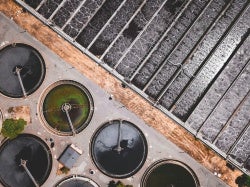 Bidders await NWC decision on sewage contract
Bidders await NWC decision on sewage contract17 February 2026
-
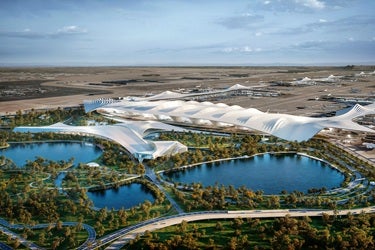 Dubai tenders Al-Maktoum airport superstructure
Dubai tenders Al-Maktoum airport superstructure17 February 2026
-
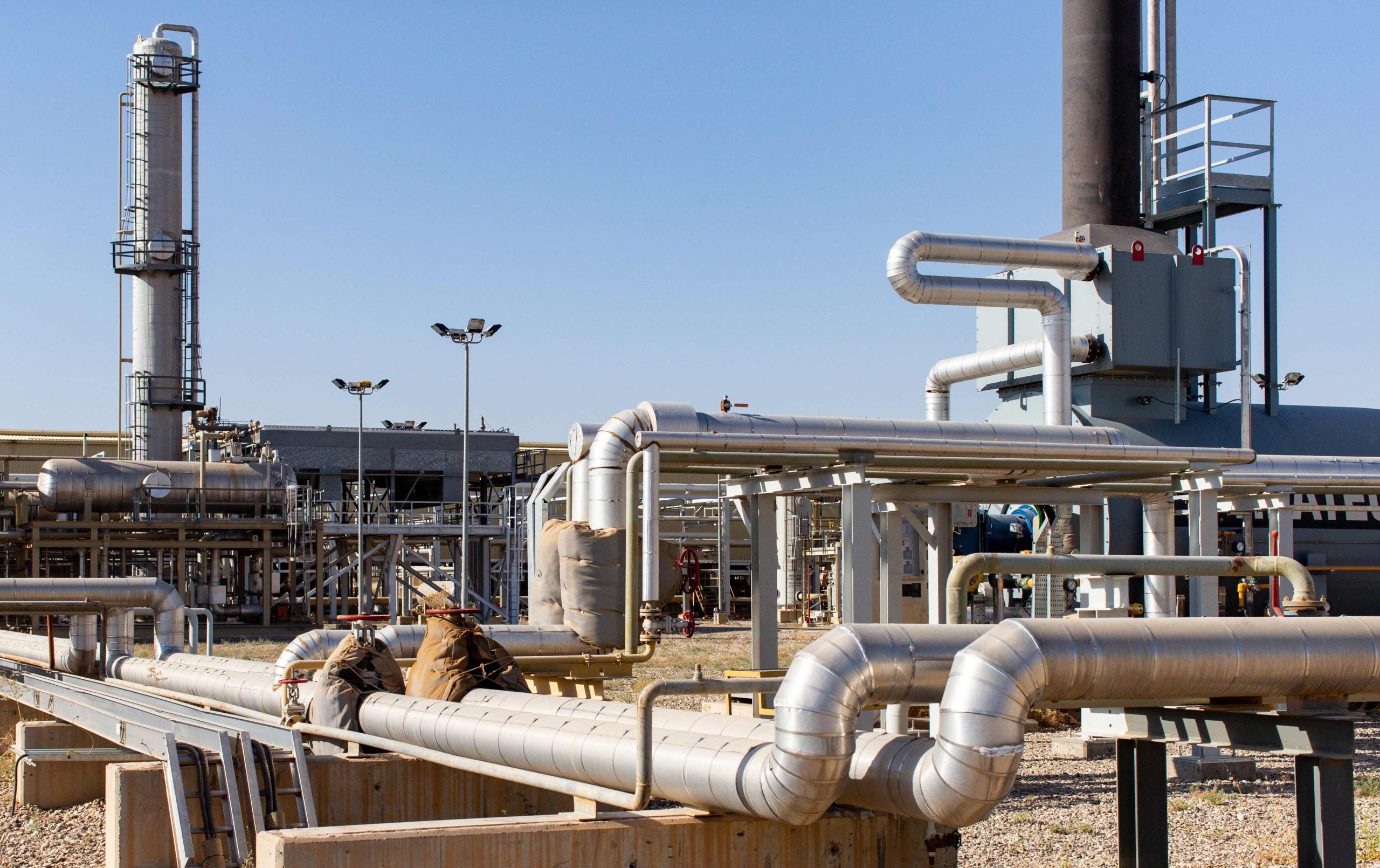 Contractors submit revised prices for Habshan 7 project
Contractors submit revised prices for Habshan 7 project17 February 2026
-
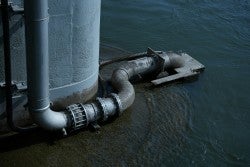 Dubai seeks contractors for Jebel Ali STP expansion
Dubai seeks contractors for Jebel Ali STP expansion16 February 2026
-
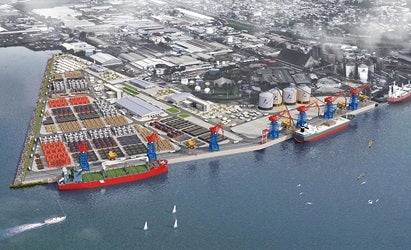 AD Ports to develop Douala port in Cameroon
AD Ports to develop Douala port in Cameroon16 February 2026
All of this is only 1% of what MEED.com has to offer
Subscribe now and unlock all the 153,671 articles on MEED.com
- All the latest news, data, and market intelligence across MENA at your fingerprints
- First-hand updates and inside information on projects, clients and competitors that matter to you
- 20 years' archive of information, data, and news for you to access at your convenience
- Strategize to succeed and minimise risks with timely analysis of current and future market trends

Related Articles
-
 Bidders await NWC decision on sewage contract
Bidders await NWC decision on sewage contract17 February 2026

Saudi Arabia’s National Water Company (NWC) is evaluating five bids for package 12 of its long-term operations and maintenance (LTOM12) sewage treatment programme.
Known as the North Western B Cluster, LTOM12 forms part of the second phase of NWC’s rehabilitation of sewage treatment plants programme.
The contract covers the construction and upgrade of seven sewage treatment plants with a combined capacity of about 162,000 cubic metres a day (cm/d).
As MEED understands, the companies that have submitted proposals include:
- Alkhorayef Water & Power Technologies (Saudi Arabia)
- Civil Works Company (Saudi Arabia)
- Miahona (Saudi Arabia)
- Beijing Enterprises Water Group – BEWG (Hong Kong)
- Al-Yamama (Saudi Arabia)
Earlier this month, MEED exclusively reported that six contractors are competing for the North Western A Cluster Sewage Treatment Plants Package 11 (LTOM11), which has an estimated value of about $211m.
The project involves the construction and upgrade of two sewage treatment plants with a combined capacity of about 440,000 cm/d.
The scheme is being procured on an engineering, procurement and construction (EPC) basis with a long-term operations component.
It is understood that contracts for LTOM11 and LTOM12 will be awarded in May.
In January, a consortium of United Water (China), Prosus Energy (UAE) and Armada Holding (Saudi Arabia) won the main contract for the Northern Cluster Sewage Treatment Plants Package 10 (LTOM10).
This contract was the first to be awarded under the second phase of NWC’s rehabilitation of sewage treatment plants programme.
NWC previously awarded $2.7bn-worth of contracts for the first phase of its LTOM programme. This comprises nine packages covering the treatment of 4.6 million cm/d of sewage water for the next 15 years.
https://image.digitalinsightresearch.in/uploads/NewsArticle/15670141/main.jpg -
 Dubai tenders Al-Maktoum airport superstructure
Dubai tenders Al-Maktoum airport superstructure17 February 2026

Dubai Aviation Engineering Projects (DAEP) has tendered three packages covering superstructure works for the first phase of the expansion of Al-Maktoum International airport.
Interested bidders have until 23 March to submit their proposals.
MEED understands that the selected contractor will undertake superstructure works on three packages:
- West Terminal and concourse one
- Concourse two
- Concourse three
Construction on these packages began in November last year, when DAEP formally selected a contractor to deliver the substructure works.
According to an official description on DAEP’s website, the expanded airport’s West Terminal will be a seven-level, 800,000-square-metre facility with an annual capacity of 45 million passengers.
It will be the second of three terminals at Al-Maktoum International airport, linked to the airside by a 14-station automated people-mover (APM) system.
In August, MEED exclusively reported that DAEP had received bids from firms to build the APM at the airport.
The system will run under the apron of the entire airfield and the airport’s terminals. It will consist of several tracks, taking passengers from the terminals to the concourses.
Four underground stations will be built as part of the first phase. The overall plan includes 14 stations across the airport.
The airport’s construction is planned to be undertaken in three phases. The airport will cover an area of 70 square kilometres (sq km) south of Dubai and will have five parallel runways, five terminal buildings and 400 aircraft gates.
It will be five times the size of the existing Dubai International airport and will have the world’s largest passenger-handling capacity of 260 million passengers a year. For cargo, it will have the capacity to handle 12 million tonnes a year.
Construction progress
Construction on the first phase has already begun. In May last year, MEED exclusively reported that DAEP had awarded a AED1bn ($272m) deal to UAE firm Binladin Contracting Group to construct the second runway at the airport.
The enabling works on the terminal are also ongoing and are being undertaken by Abu Dhabi-based Tristar E&C.
Construction on the project’s first phase is expected to be completed by 2032.
The government approved the updated designs and timelines for its largest construction project in April 2024.
In a statement, the authorities said the plan is for all operations from Dubai International airport to be transferred to Al-Maktoum International within 10 years.
The statement added that the project will create housing demand for 1 million people around the airport.
In September 2024, MEED exclusively reported that a team comprising Austria’s Coop Himmelb(l)au and Lebanon’s Dar Al-Handasah had been confirmed as the lead masterplanning and design consultants on the expansion of Al-Maktoum airport.
Project history
The expansion of Al-Maktoum International, also known as Dubai World Central (DWC), is a long-standing project. It was officially launched in 2014, with a different design from the one approved in April 2024. At that time, it involved building the biggest airport in the world by 2050, with the capacity to handle 255 million passengers a year.
An initial phase, due to be completed in 2030, involved increasing the airport’s capacity to 130 million passengers a year. The development was to cover an area of 56 sq km.
Progress on the project slipped as the region grappled with the impact of lower oil prices and Dubai focused on developing the Expo 2020 site. Tendering for work on the project then stalled with the onset of the Covid-19 pandemic in early 2020.
https://image.digitalinsightresearch.in/uploads/NewsArticle/15669879/main.jpg -
 Contractors submit revised prices for Habshan 7 project
Contractors submit revised prices for Habshan 7 project17 February 2026

Adnoc Gas has received revised commercial proposals from contractors for engineering, procurement and construction (EPC) works on a major project to add a new gas processing train at its Habshan complex in Abu Dhabi.
Adnoc Gas, the natural gas processing business of Abu Dhabi National Oil Company (Adnoc Group), processes about 10 billion standard cubic feet a day (cf/d) of gas across several sites, including its Asab, Bab, Bu Hasa and Habshan facilities, as well as a natural gas liquids (NGL) fractionation plant at Ruwais.
The Habshan complex is one of the largest gas processing facilities in the UAE and across the Middle East and North Africa. Its output capacity is 6.1 billion cf/d. The complex comprises five trains and 14 processing units that receive gas feedstock from onshore and offshore fields in Abu Dhabi.
With Adnoc Group pressing ahead with its P5 programme to raise oil production potential to 5 million barrels a day by 2027, high volumes of associated gas are set to enter the grid.
The new train at the Habshan complex, which Adnoc Gas expects to commission in 2029, will play a key role in handling these additional gas volumes.
MEED previously reported that contractors had submitted commercial bids for the new Habshan 7 gas train project to Adnoc Gas by the deadline of 10 December.
Following an initial evaluation of commercial bids received, Adnoc Gas sought “best offers” from contractors for the project. Bidders submitted their revised prices by 6 February, according to sources.
The following contractors are understood to be competing for the Habshan 7 project’s main EPC contract, as per sources:
- Enppi (Egypt) / Petrojet (Egypt)
- Jereh (China)
- Larsen & Toubro Energy Hydrocarbon (India)
- Petrofac (UK)
- Sinopec (China)
- Wison Engineering (China)
MEED previously reported that contractors submitted technical bids for the project to Adnoc Gas by the deadline of 6 October.
Adnoc Gas intends to install the Habshan 7 train adjacent to the Habshan 5 train. This will enable the new train to utilise the ullage in the Habshan 5 sulphur recovery and tail gas treatment units and optimise operations.
The scope of work on the Habshan 7 gas train project covers the EPC of the following units:
- New high-pressure pipeline from the main Habshan complex to the new gas train
- Separation and condensate stabiliser unit
- Acid gas removal unit
- Mercury removal unit
- Deep NGL recovery unit
- Sales gas and residue gas compressor
- NGL product storage and transfer pump, as well as metering skid
- Utility units (IA, N2, PW, FW, steam generation, DM)
- Flare unit, to be located in Habshan 5 on common derrick
- Flare gas recovery package
- Water treatment package
- Non-process buildings, to be located outside the Habshan 5 train
- Power generation system
- NGL pipeline from Habshan 5 to Ruwais, based on an existing pipeline assessment
- Sales gas pipeline from Habshan 5 to sales gas network.
UK-headquartered Wood Group has performed the concept study and initial engineering design for the project.
The Habshan 7 gas train project represents the third phase of Adnoc Gas’ Rich Gas Development programme and is estimated to be valued at $3.5bn-$4bn, according to the company’s chief financial officer, Peter Van Driel.
In a recent call with journalists to discuss Adnoc Gas’ financial results for the full year and fourth quarter of 2025, Van Driel said Adnoc Gas expects to achieve a final investment decision on the Habshan 7 gas train project, which is designed to increase the company’s production of high-value liquids such as liquefied petroleum gas, naphtha and condensates, in the first quarter of 2026.
Adnoc Gas issued the main EPC tender for the new Habshan 7 gas train project to contractors between 5 and 8 August, MEED previously reported. It later extended the initial technical bid submission deadline from mid‑September to 6 October.
In April, MEED reported that Adnoc Gas had started an early engagement process with contractors for the EPC tendering phase of the Habshan 7 gas train project.
Prior to that, Adnoc Gas issued an expression of interest (EoI) document for the project in March, to which contractors submitted responses by 8 April.
Separately, Adnoc Gas also completed the EoI exercise for early civil and site preparation works on the Habshan 7 project in June, and is understood to have issued the main tender in the third quarter.
ALSO READ: Adnoc Gas stalls decision on Ruwais NGL project
https://image.digitalinsightresearch.in/uploads/NewsArticle/15663150/main5247.jpg -
 Dubai seeks contractors for Jebel Ali STP expansion
Dubai seeks contractors for Jebel Ali STP expansion16 February 2026
Dubai Municipality has invited contractors to prequalify for a contract covering the expansion of the Jebel Ali sewage treatment plant (STP) phases one and two.
The upgraded facility will be capable of treating an additional sewage flow of 100,000 cubic metres a day (cm/d).
The scope includes the design, construction and commissioning of infrastructure and systems required to support the increased capacity.
The bid submission deadline is 2 April.
Located on a 670-hectare site in Jebel Ali, the original wastewater facility has a treatment capacity of about 675,000 cm/d following the completion of phase two in 2019, combining approximately 300,000 cm/d from phase one and 375,000 cm/d from phase two.
As MEED understands, the project is part of long-term plans to treat about 1.05 million cm/d a day once all future phases are completed.
The main element of the expansion, which is estimated to cost $300m, involves modifications to the secondary treatment process at Jebel Ali STP phase two.
This includes conversion to Moving Bed Biofilm Reactor or Integrated Fixed-Film Activated Sludge systems.
The project also includes decommissioning existing surface aerators. New blowers and associated works will be installed as part of the upgrade.
UK-headquartered KPMG and UAE-based Tribe Infrastructure are serving as financial advisers on the project.
https://image.digitalinsightresearch.in/uploads/NewsArticle/15661388/main.jpg -
 AD Ports to develop Douala port in Cameroon
AD Ports to develop Douala port in Cameroon16 February 2026
Abu Dhabi’s AD Ports Group and Africa Ports Development (APD) have signed an agreement to design, build and operate a new dry bulk terminal at the Port of Douala in Cameroon.
AD Ports Group will invest about AED320m ($87m) in the development of the terminal’s first phase, which will comprise two berths and more than 450 metres of quay wall, with an annual handling capacity of about 4 million tonnes of dry bulk cargo.
Construction is expected to begin this year, and the first phase is slated for completion in 2028.
The concession period is 30 years.
AD Ports Group has committed to long-term investments and operations across Africa, including in Egypt, Morocco, Tunisia, Kenya, Tanzania, Angola and the Republic of the Congo.
The latest announcement comes shortly after it signed an agreement with Jordan’s Aqaba Development Corporation (ADC) to manage and operate the Aqaba multipurpose port.
AD Ports will manage and operate the port under a 30-year concession agreement.
In December last year, AD Ports Group signed a shareholder agreement with Tajikistan’s private industrial firm Avesto Group to establish a new joint venture that will provide integrated logistics and freight forwarding services across Tajikistan.
Under the agreement, the joint venture will initially operate as an asset-light freight forwarder. It will have exclusive rights to consolidate and manage all freight and logistics activities across Avesto Group’s subsidiaries, while also offering services to third-party customers in the wider market.
https://image.digitalinsightresearch.in/uploads/NewsArticle/15661385/main.jpg


